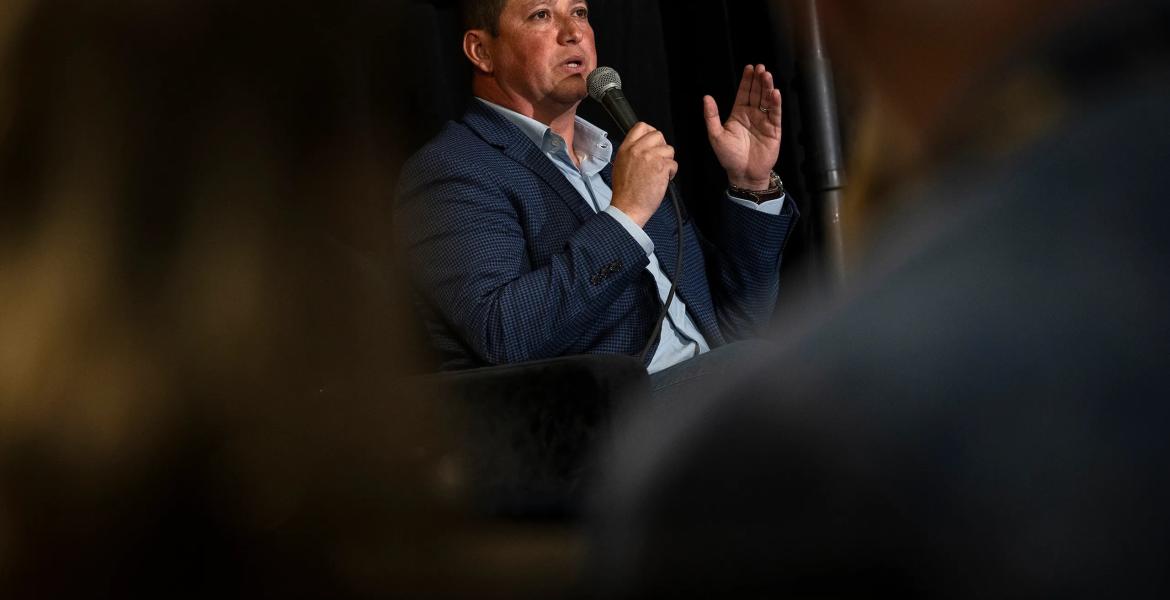It’s not a crisis yet, but the Day of Reckoning is coming. San Angelo is running out of space in its landfill, or dump, where the City of San Angelo and many of the surrounding communities as far away as Junction send all of their trash. “We have another 15-17 years left at the current landfill,” says Shane Kelton, the City of San Angelo’s Operations Director. The estimates of growth of the city range from 3,000 to 20,000 from the oil boom. “Obviously, that will shorten the timeframe until the landfill is at capacity,” Kelton adds.
Of all 10 landfills within all counties in the Concho Valley Council of Governments, the Texas Commission on Environmental Quality, or TCEQ, estimates there are 26 years left on average. Statewide, the TCEQ estimates that all landfills have an average life remaining of 64 years. That means San Angelo’s future landfill capacity is 10 years below the region’s average and 49 years below the state’s average.
A lack of space to throw out the trash in the sprawling, endless real estate of west Texas seems impossible. Why not buy another tract of land and keep on dumping?
County Commissioner Steve Floyd serves on the Council of Governments Solid Waste Advisory Committee that is tasked with administering grants that reduce waste. “The county used to own the landfill. But the environmental regulations from the TCEQ got too restrictive, and there aren’t enough qualified people here to run them. The county turned it all over to the city because the county is not in the municipal services business,” Floyd says. The same thing happened to the smaller dumps in the county. “Rather than comply, smaller communities like Robert Lee closed their landfills. So all of the communities in the area are using San Angelo’s,” Floyd says.
San Angelo’s landfill is the only one left in Tom Green County.
If existing landfills closed because of restrictive government regulations, the thought of any agency or private company opening more is probably impossible because of the costs and liabilities.
Kelton says approximately 50% of the trash dumped at the city’s landfill is from inside the city limits trash pickup. The other 50% is from the county residents and surrounding municipalities who pay to dump their trash here.
Kelton says that the city has an additional 320 acres abutting the north end of the current landfill that have yet to be permitted, and will require jumping through regulatory hoops to make it part of the current landfill. It will take two years and $2 million before any of the infrastructure and ground-testing equipment is built, Kelton told council at the Aug. 6 meeting.
With the landfill filling up how should San Angelo plan ahead?
Floyd says we should look at how Brady adapted. “Brady is sort of land-locked,” Floyd explains. They had to incorporate an aggressive recycling and use program to preserve space in their landfill. The result is that Brady’s landfill has 80 years of use left. Brady’s recycling trailers are centrally located in town.
“The San Angelo Recycling Center is as active as it can be,” Floyd says. “If you want to help do something about it, you’re free to do so now.”
Kelton doesn’t think operating a single drop-off for recycling is going to save San Angelo’s landfill capacity that much, however. “It’s going to take education and people will need to learn how to recycle,” he says. The convenience of a recycling pickup at each residence, or curbside recycling, may help because of its convenience.
Even with curbside recycling pickup, Kelton estimates that recycling will only amount to 5% to 7% of the city pickup trash volume. “Those are the numbers I’ve seen from single stream municipal recycling programs,” Kelton says. That number can grow handsomely to 50% of the total volume “if you have someone at the landfill that’s really on top of it,” Kelton estimates.
What Kelton means is, if you have a building contractor dumping nothing but scrap wood from a job project, for example, you could create a workflow and train landfill operators to divert that dumper to the wood recycling area of the landfill.
Republic Services’ San Angelo General Manager Kenneth Ramzinski is optimistic. He thinks that 50% of the landfill input can be diverted with a recycling program “if it’s running on all cylinders.” Republic Services has the contract with the City of San Angelo to manage the landfill and provide municipal trash pickup.
Ramzinski suggests that there’s another obstacle in the way of a curbside recycling program.
“There’s no [Material Recovery Facility] MRF in west Texas,” Ramzinski says. “Transporting recyclables can get expensive.”
What is an MRF? Watch this:
Republic recently built an MRF in Fort Worth. “It cost $14 million. It’s a big facility,” Ramzinski says. Turning San Angelo’s landfill into a regional recycling facility is an option we can put on the table,” he says. The cost? “Probably around $7-10 million,” says Ramzinski.
San Angelo Mayor Dwain Morrison says the city council has considered curbside recycling pickup in the past, but declined to add the service because it would cost more. “Do the people of San Angelo want to pay $10 more per month for the extra truck run?” Morrison asks.
Currently, the city tacks on $9.81 to every residential water bill for trash pickup service.
“I’ve seen a petition from concerned citizens wanting us to start a curbside recycling program,” Morrison says. “But there are only 15-16 signatures on it.”
Morrison notes that the more affluent areas of town can afford the extra charge for recycling, but in the poorer parts of town anything extra “is a whole lot of money to them.”
Bobby Gregory, the CEO of Texas Disposal Systems (TDS) in Austin, grew up in San Angelo and has been lobbying the San Angelo City Council for about three years to give his company a shot at providing trash pickup with recycling and landfill management.
“We can do curbside trash collection and recycling together for the same price ($10),” he says.
Gregory runs a scrappy, insurgent waste management company that, Gregory contends, has built a sustainable economic model around trash pickup, recycling and disposal in central Texas around Austin. He has 600 employees.
His innovative approach to trash disposal and recycling has made so much noise on the I-35 corridor that his company has been involved in a 16-year court battle with global conglomerate Waste Management, a very large competitor, over defamation (TDS accuses Waste Management of the defamation, court documents say).
Gregory’s business process, in summary, is to maximize recycling, and part of the output of the recycling process is compost. TDS operates Garden-Ville retail outlets that sell the compost (among other gardening necessities) to the public. The remaining aluminum, plastic, glass and paper is sold on the market after it is processed.
TDS bought and constructed a $17 million MRF on a 2,000 acre complex right off I-35 on the southeast side of Austin. The landfill and recycling center are so green, Gregory contends, that much of the land is an exotic game ranch. He is serious.
Gregory says that the cost of trucking recyclables from San Angelo to Austin is offset by transporting compost back to San Angelo to sell at a to-be-established Garden-Ville in San Angelo.
TDS just signed a trash pickup and recycling contract with Angelo State University and the City of Alpine is also a client.
At the July 15, 2013 San Angelo City Council meeting, TDS had to obtain permission to operate TDS trucks on city streets, to and from ASU, the city’s dump and Austin. Charlotte Farmer made a motion to deny the permit, then recused herself because she said she was Gregory’s distant relative. “I have no idea how we’re related,” Gregory says. Council approved Gregory’s permit.
Gregory says that the city isn’t making money on the landfill, and it should be. Kelton confirms that. “They’re dumping the trash from 25 different communities into that landfill, filling it up, and gouging them [the surrounding area],” Gregory contends. “We’d love to buy that landfill,” he says. “It’s a cash cow.”
The difference, Gregory says, is that large, corporate and incumbent waste management companies are stuck on old, outdated business models. TCEQ and Environmental Protection Agency (EPA) regulations are making it more and more difficult to successfully manage landfills using “dump and scoop” workflows. Gas is expensive (“We’re converting to natural gas for our fleets,” Gregory says), and labor isn’t cheap, either.
“All we want is a shot at providing trash collection and recycling services to the entire City of San Angelo,” he says.
Will The City of San Angelo's City Council Open the Trash Collection Contract for Competitive Bid?
Kelton cannot recall when the city’s trash collection contract has been decided by competitive bid. Republic Services and the ancestor companies that Republic gobbled up in mergers and acquisitions have simply renegotiated the contract as it comes up for renewal. The current city contract with Republic was signed in 2004 and ends in July 2014, according to Kelton. It has two five-year renewal options. But Kelton says, he’s awaiting the decision from council on what the next move is, whether it’s to renegotiate a contract with Republic, or put the trash collection and landfill management up for public bid, as TDS’s Gregory hopes.
At the August 6, 2013 City Council meeting, Councilwoman Charlotte Farmer introduced an agenda item to renew the Republic contract for five years, and then, incredulously, renegotiate certain aspects of the contact pertaining primarily to the landfill after the contract was signed. City Manager Daniel Valenzuela appeared to support Farmer’s tactic, suggesting that a signed contract could be renegotiated.
Farmer said that Republic wanted the contract renewed early so that the corporation would be more inclined to invest $500,000 in new automatic trash trucks for residential pickup. (Update: After reviewing the meeting's video again, Farmer mentions $500k per truck. No total number of trucks or total amount of investment was mentioned.)
Republic has been testing the automated trucks in six areas of the city. These are the trucks that pick up the trash “carts” (or large cans) with a mechanical arm instead of using human labor on the back of the trucks. According to Ramzinski, the newer trucks mitigate his human resources recruitment problem, since the trucks can be operated with fewer personnel in less demanding positions in the truck’s cab.
Hiring workers to pick up the trashcans and dump them into the back of the trucks is difficult. “It’s really hard to find people to do that today. It’s physically demanding,” Ramzinski says. The job pays approximately $11 per hour, he says. “We’ve even had problems with temporary workers from staffing agencies. They usually fail to show up the next day,” he says.
Meanwhile, back at the August 6 council meeting, Councilman Rodney Fleming seconded Farmer’s motion, and the council was ready to vote to renew the Republic contract and then renegotiate the terms afterwards. Mayor Morrison, nowadays a source of sage street wisdom, said that renewing and then renegotiating “makes no sense!”
The council was barraged by a stream of citizens’ comments demanding that they wait, starting first with TDS’s Gregory agreeing with the mayor. Somewhere in between the exchanges, Councilman Winkie Wardlaw announced that “as a lawyer” he’s fine with signing a renewal and then renegotiating.
Billie Dewitt, a citizen who identified himself as a community volunteer warned the council that, if they vote to renew before the contract is renegotiated, the entire council will be subjected to public ridicule and questions.
With that, Fleming revoked his second, forcing Wardlaw to replace Fleming’s second.
The vote to renew and then renegotiate with Republic failed 5-2. Farmer and Wardlaw were the two remaining who supported signing the contract first, before renegotiating with Republic.
After the vote, Councilman Johnny Silvas, who stated that he originally supported renewal before renegotiations, clamored about making a second motion to authorize city staff to renegotiate a contract for council vote at a future meeting. The mayor jumped in with his oft-repeated suggestion, in his low, growling voice. “Let the thing die. Just let it die.”
So the issue died, at least for the August 6 meeting.
Kelton is on the agenda Nov. 5 in an open agenda item to discuss and possibly take action on solid waste collection and landfill operations. Kelton says he’s seeking direction from council on how to proceed: Negotiate new terms with Republic, or put the trash collection and landfill operations up for public bid.
TDS’s Gregory says he’ll be there too.
In the meantime, solutions to the landfill problem, recycling, and upgrading the trash collection services are in limbo.
Subscribe to the LIVE! Daily
Required






Comments
Listed By: Jim Turner
One of the things that delayed the whole recycling movement locally was the waste gasification project proposed by Siemens. The project quietly died about 5 years ago but it kept recycling off the table because the Siemens proposal would have automatically separated the waste at the landfill. Siemens never demonstrated they could build and operate the plant safely and several other gasification plants have been shut down because of toxic emissions. It's a technology that has potential but is difficult to do cleanly and safely. The proposal, among other issues, took recycling off the table locally for several years.
- Log in or register to post comments
PermalinkListed By: Joe Hyde
Kelton said that the landfill is under special monitoring status with the TCEQ because of possible groundwater contamination. The older, closed portion of the dump registered higher than acceptable levels of Volitile Organic Compounds (VOC) in the mid-2000s forcing the city to perform to this day mitigation procedures. Because of this, it will probably be a cold day in hell before any city council approves burning(?) trash to generate energy.
- Log in or register to post comments
PermalinkListed By: Jim Turner
There are a couple issues at the landfill that are being monitored. VOC's are one. The methane (which the city says it wants to capture and sell) is another. A proposal was brought forward to either build a small power plant or sell the methane to a commercial user.
The VOC's at the landfill were addressed by Siemens proposal. We're not just talking a standard incinerator here. If everything worked as designed then the process would be nice and clean. Problem is that if the temperature got a little off or there were certain metals in the mix then nasty things like Dioxins were produced. Some cities have tried this gasification process. The success rate has been very poor.
So far they are special monitoring our landfill, river down stream, and soon our drinking water for radio nucleotides. Forget the oil field. The most secure jobs in the area will be working for TCEQ/EPA.
- Log in or register to post comments
PermalinkListed By: Andrew K
- Log in or register to post comments
PermalinkListed By: Paul Alxander
- Log in or register to post comments
PermalinkListed By: Robert Searls
- Log in or register to post comments
PermalinkPost a comment to this article here: